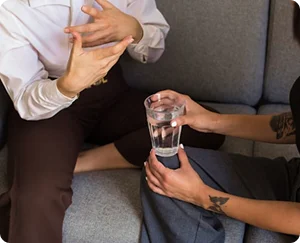Cocaine Addiction Treatment in New Hampshire
At Live Free Recovery, we provide compassionate, evidence-based cocaine addiction treatment in a setting that prioritizes safety, structure, and long-term healing.


Understanding Cocaine Addiction
Cocaine is a powerful stimulant. It’s best known for having a short-lived high and major potential for addiction. Often glamorized in media and party culture, cocaine is commonly used in social settings, especially among professionals or young adults chasing energy, focus, or confidence.
SAMHSA reports that around 5.2 million people in the US reported cocaine use in 2020, which is a startling number. But what begins as a casual “line” can quickly spiral into dependency.
Street Names for Cocaine
Substance use can sometimes fly under the radar thanks to the many colloquial names or street names used. While terms shift often, here are ten common nicknames you might hear.
- Blow
- Snow
- Coke
- Yayo
- White
- Flake
- Nose candy
- Toot
- Powder
- Bump
Signs of Cocaine Addiction
Every drug comes with telltale signs, but they don’t always look the same for everyone. Patterns of use, personal history, and how someone’s body reacts can all shape how addiction shows up. Still, recognizing the more common red flags can help you spot problems early and get your loved one the support they need before things escalate.
Physical signs:
- Dilated pupils
- Runny nose or frequent sniffing
- Weight loss
- Nosebleeds
Psychological signs:
- Intense mood swings
- Paranoia
- Restlessness or anxiety
- Short attention span
Behavioral signs:
- Secretive behavior
- Risky decision-making
- Financial trouble
- Withdrawing from family and responsibilities
Co-Occurring Disorders
Cocaine addiction often overlaps with mental health conditions like anxiety, depression, or PTSD. This is known as dual diagnosis. When both issues aren’t treated together, recovery tends to unravel. At Live Free Recovery, we offer integrated care that tackles addiction and what’s beneath it, building a stronger foundation for lasting change.

How Cocaine Affects the Brain
Cocaine interferes with how your brain processes dopamine, the chemical tied to pleasure and reward. It creates an intense high that’s followed by a crash, fueling the cycle of use. Over time, your brain stops producing dopamine naturally, making it harder to feel joy without the drug. This rewiring makes quitting feel impossible without help.
Short-Term Effects of Cocaine Abuse
- Euphoria
- Increased energy
- Loss of appetite
- Elevated heart rate
- Restlessness
Long-Term Effects of Cocaine Abuse
- Insomnia
- Depression
- Cognitive decline
- Heart problems
- High blood pressure
Cocaine Withdrawal Symptoms and Detox Timeline
Unlike alcohol or opioids, cocaine withdrawal is less about physical danger and more about mental strain. It usually begins within a few hours and peaks around days 2 to 4. Most symptoms ease within a week, though cravings and mood shifts can linger longer. Common symptoms include fatigue, anxiety, low mood, and vivid dreams. At Live Free Recovery, we offer monitored detox when needed.

How Live Free Recovery Treats Cocaine Addiction
At Live Free, we look at addiction treatment holistically. Our programs combine structure, therapy, and community, with separate tracks for men and women, trauma-informed care, and dual diagnosis support.
Inpatient Rehab
In residential care, you live at the facility and receive daily therapy, peer support, and personalized care in a structured environment.
Partial Hospitalization Program
Get full-day treatment (typically 5 to 8 hours) and return home at night, offering strong support without overnight stays.
Intensive Outpatient Program
Join part-time treatment several days a week for 3 to 4 hours per session. It’s great for those stepping down from higher levels of care.
Outpatient Rehab
Attend outpatient treatment while living at home. This option allows for a balance between treatment and daily responsibilities.
Evidence-Based Therapies and Substance Abuse Counseling
- Cognitive-Behavioral Therapy (CBT) – Tackle unhelpful thinking and build new coping skills.
- Dialectical Behavior Therapy (DBT) – Strengthen emotional control and reduce impulsive behavior.
- Motivational Interviewing – Enhance your inner drive to change through non-judgmental conversations.
- Couples Therapy – Rebuild trust, communication, and support between romantic partners.
- Family Therapy – Help loved ones understand the recovery process and how to offer real, healthy support.
- Individual Therapy – One-on-one sessions that focus on your story, struggles, and strengths.
- Group Therapy – A space to connect, share, and learn from peers walking a similar path.
- Holistic Therapy – Practices like yoga and meditation to ground and support your whole self in recovery.
Life After Cocaine: Building a Sustainable Recovery
Recovery doesn’t end at discharge: it just evolves. The transition back to daily life comes with challenges as well as growth. We help you stay grounded, focusing on relapse prevention, peer support, and ongoing accountability. Sober living, community, and a clear sense of purpose give recovery the legs it needs to last.
Get Expert Addiction Treatment at Live Free Recovery
At our treatment center, you’ll find a team that believes in second chances and creates space for real transformation. We offer expert care, real connection, and a path forward that sticks. Reach out today: we’re here to help you take that first step and the next.

FAQs
How long does cocaine stay in your system?
Cocaine typically stays in your system for 1 to 2 days, but this can vary based on the frequency of use and individual factors.
Crack vs. cocaine: what’s the difference?
Crack is a smokable, more potent form of cocaine that produces a faster, more intense high, but also increases the risk of addiction.
What happens during cocaine addiction treatment?
Treatment usually includes therapy, peer support, and structured programs to help you build healthier coping mechanisms and stay sober.
How long does cocaine addiction treatment last?
Program length varies depending on your needs, but typically ranges from a few weeks to several months.
Can I receive cocaine addiction treatment without going to rehab?
Yes. Outpatient programs allow you to receive treatment while living at home and maintaining responsibilities.
Do I need detox for cocaine use?
Some people benefit from a short detox period, especially if symptoms are intense. Our team can help determine what level of care you need.
Can I recover if I’ve relapsed multiple times?
Absolutely. Many people relapse before finding lasting recovery. What matters is your next step, not your last one.
Will my mental health be treated too?
Yes. We offer integrated care that treats both substance use and co-occurring mental health conditions.
What does a typical day in treatment look like?
You’ll attend individual and group therapy, participate in recovery-focused activities, and have time for rest, reflection, and personal growth.
